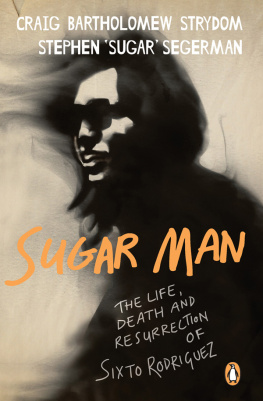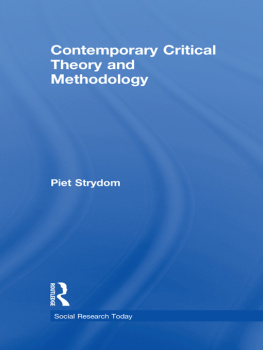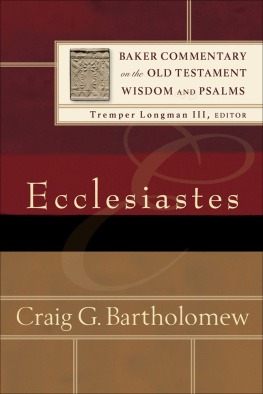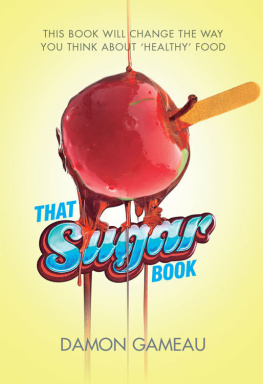Authors note
Rodriguezs small but mysterious oeuvre has long been a subject of fascination to South African and Australian audiences alike. Today, thanks to the intervention of his fans and the popular documentary Searching for Sugar Man , the interest in Rodriguezs music has at last become global.
The intersecting stories that make up this book are an attempt to chart the singers long journey from obscurity to fame. Writing it, however, presented certain challenges. The first was how to solve the problem of collaborative nonfiction in this case a story told by two authors who are also protagonists of the story. In the end we drew inspiration from the book All the Presidents Men , in which journalists Carl Bernstein and Bob Woodward solved a similar problem by writing about themselves in the third person when telling the story of Watergate and their role in uncovering it.
The second challenge was how to structure the book, with its three main overlapping stories set on different continents and spanning several decades. With the help of our managing editor Robert Plummer, the problem was soon solved, resulting in the tetralogy of stories that you now hold in your hand: the Mystery, the Man, the Music and the Movie.
We are grateful for Roberts insight and intellect, as well as the sharp eye and narrative skills of our editor Bronwen Maynier, the courage and foresight of our publisher Marlene Fryer, and the support of all at Penguin Random House South Africa. It was serendipitous that at the exact moment you were looking for someone to write the Rodriguez story, we came calling. Thanks also to South African MD Steve Connolly and to Transworld publisher Doug Young and rights manager Ann-Katrin Ziser for believing in this book and taking it to a wider audience.
Pinning down the facts of Rodriguezs life has been as difficult as tracking him down in the first place. We would like to acknowledge the many people who were forthcoming and generous in their responses to our numerous requests for information: Mike Theodore, Dennis Coffey, Steve Rowland, Camilla Skagerstrm, Johar Bendjelloul, Simon Chinn, Janice Prezzato, Matt Sullivan and Josh Wright from Light in the Attic, Kevin Sipreano Howes, Ralph Terrana, Roger Armstrong, Tonia Selley, Graeme Currie, Willem Mller, Kelly Moore, Willemiek Kluijfhout, Maurice Greenia, Brian Currin, Brittany Huckabee, Terry Fairweather and Gerardo Ramos. Thanks also to everyone who has researched Rodriguez and contributed to our knowledge of him, such as Glenn A. Baker, Jerry Schollenberger, Harry Young and the many people who have posted on the websites The Great Rodriguez Hunt/Site, Climb Up on My Music, and Sugarman.org.
Sugar would like to extend special love and thanks to Ronit, Natalia, Raphael, Daniell, Joyce, Sheila, and all the Segerman and Benjamin families, for your continued love and support and for sharing this wonderful journey. Thanks also to Brian Currin for your loyal and constant commitment to the Sugarman.org website, which has proved to be an invaluable part of this whole story, and to Andre Bakkes, Andy Harrod, Alec McCrindle, Josh Georgiou, Alan Freedman, Henri Talerman, Jacques Vosloo, Alan Levin, Justin Cohen, Tyrone Rubin, John Samson and Buddy.
Craig would like to thank Henry and Pat, Bert and Gladys, Michelle, Adrian, Gina, Bernice and Isabella, for your constant love and encouragement, and Philippa, whose love and affection permeates each and every page of this book.
Our eternal gratitude goes out to the late Malik Bendjelloul, whose wonderful film finally achieved what we had been trying to do for so long: getting Rodriguezs music the global recognition it deserves. Thank you to Hacne Bendjelloul and Veronica Schildt Bendjelloul for giving us permission to reprint Maliks correspondence.
Last but not least, we wish to acknowledge the legend himself Sixto Rodriguez and his daughters Eva, Sandra and Regan, for their friendship and participation over the years.
CRAIG BARTHOLOMEW STRYDOM
STEPHEN SUGAR SEGERMAN
CAPE TOWN, JULY 2015
Contents
Published by Penguin Books
an imprint of Penguin Random House South Africa (Pty) Ltd
Reg. No. 1953/000441/07
The Estuaries No. 4, Oxbow Crescent, Century Avenue, Century City, 7441
PO Box 1144, Cape Town, 8000, South Africa
www.penguinbooks.co.za
First published 2015
Publication Penguin Random House 2015
Text Craig Bartholomew Strydom and Stephen Segerman 2015
All rights reserved. No part of this publication may be reproduced, stored in a retrieval system or transmitted, in any form or by any means, electronic, mechanical, photocopying, recording or otherwise, without the prior written permission of the copyright owners.
The song credits on constitute an extension of this copyright page.
Every effort has been made to obtain the necessary permissions with reference to copyright material, both illustrative and quoted. We apologise for any omissions in this respect and will be pleased to make the appropriate acknowledgements in any future edition.
PUBLISHER: Marlene Fryer
MANAGING EDITOR: Robert Plummer
EDITOR: Bronwen Leak
COVER DESIGNER: Gretchen van der Byl
TEXT DESIGNER: Ryan Africa
TYPESETTER: Monique van den Berg
INDEXER: Sanet le Roux
ISBN 978 1 77022 814 6 (print)
ISBN 978 1 77022 815 3 (ePub)
ISBN 978 1 77022 816 0 (PDF)
For Malik
You put together two things that have not been put together before. And the world is changed. People may not notice at the time, but that doesnt matter. The world has been changed nonetheless.
Julian Barnes, Levels of Life
You never know Rodriguez better than the first day you met him.
Malik Bendjelloul, director of Searching for Sugar Man
Maybe today, yeah
Ill slip away.
Sixto Rodriguez, Ill Slip Away
EPILOGUE
It started out so nice
(20132014)
As a child I never really was an actor, but just a child who adults told where to stand, what to do, what to say, and when not to say it.
Malik Bendjelloul, in conversation with Craig Strydom
SUGARMAN DIRECTOR WAS TRUE CAPETONIAN. So reads the headline on the Cape Times billboard. The date is 14 May 2014. It is a Tuesday. For anyone driving by, there seems to be a typo, something wrong with the tense. What do they mean was? Do they not have proofreaders at Cape Towns leading English newspaper?
* * *
Rewind to April 2013, Malik and Brittany, now living in New York, took a well-earned break, embarking on an extended trip to South Africa, the country that gave Malik the best story you will ever hear in your life (one can almost hear the enthusiasm of his voice effervescing through his trademark lilt). It was during this trip that he started seriously thinking about his next project, first as a documentary and then as a dramatic feature: the story of South African conservationist Lawrence Anthony, who during the invasion of Iraq by US forces made an emergency trip to save the last surviving animals in the Baghdad Zoo. His noble endeavour took six months and was recounted in the book Babylons Ark , which he wrote with author Graham Spence. Malik was so taken by the story that he began writing a script for a full feature film. His choice of subject was not surprising: Malik had told Sugar that he wanted to make a film where something incredible happens that would go on to change the world. For him it was the day man discovered how to communicate with animals. Maliks childlike naivety and belief in magic, in Brittanys words, made him extraordinary.
In the year after the Oscars, he was also toying around with a few other documentary ideas. At the end of July 2013, on the radio show Sommar i P produced by his brother Johar, Malik spoke candidly about his hopes and dreams and the ideas he had not yet realised. He recalled how he had once interviewed the eccentric South Africanborn pop musician Bill Drummond from the band KLF (later K Foundation), who burnt one million pounds sterling in cash in a disused boathouse. The reason, according to Malik, was to reignite the groups hunger to be creative; to once again feel what it felt like when they had no money and survived only on creativity; to feel what it felt like before disillusionment set in. Drummond, however, talking to Andrew Smith from the Guardian , posited a different and irreverent reason: It wasnt to destroy the money. It was to watch it burn.










